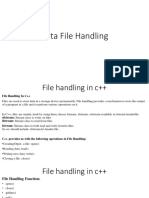0% found this document useful (0 votes)
46 views4 pagesC++ File Handling Beginners Guide
This document serves as a beginner's guide to file handling in C++, explaining how to read from and write to files using the <fstream> header. It details the three file stream classes (ifstream, ofstream, fstream), basic file operations, and various file opening modes. Additionally, it covers sequential versus random access, file pointers, and essential file functions with examples.
Uploaded by
shreyas kulkarniCopyright
© © All Rights Reserved
We take content rights seriously. If you suspect this is your content, claim it here.
Available Formats
Download as PDF, TXT or read online on Scribd
0% found this document useful (0 votes)
46 views4 pagesC++ File Handling Beginners Guide
This document serves as a beginner's guide to file handling in C++, explaining how to read from and write to files using the <fstream> header. It details the three file stream classes (ifstream, ofstream, fstream), basic file operations, and various file opening modes. Additionally, it covers sequential versus random access, file pointers, and essential file functions with examples.
Uploaded by
shreyas kulkarniCopyright
© © All Rights Reserved
We take content rights seriously. If you suspect this is your content, claim it here.
Available Formats
Download as PDF, TXT or read online on Scribd
/ 4
























































